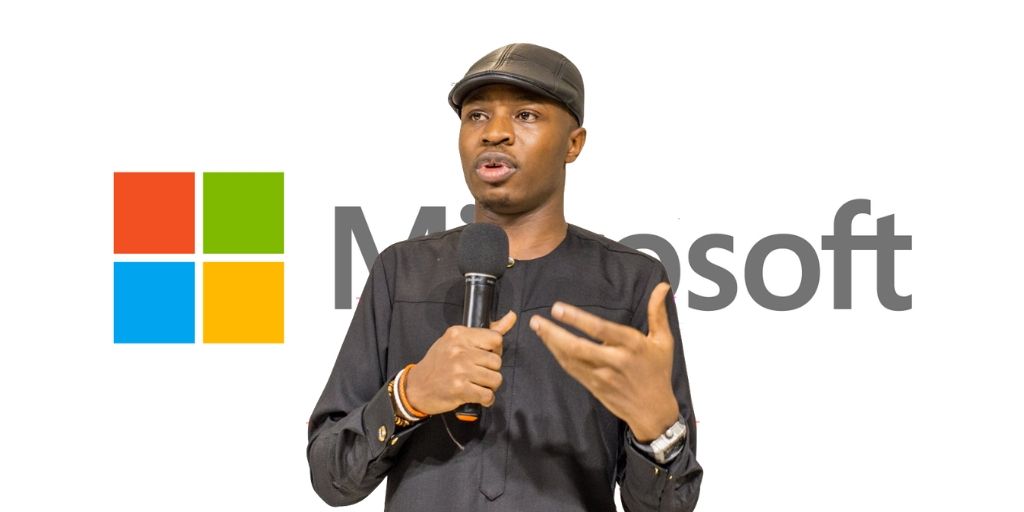Nigeria-born Developer Advocate, Codebeast joins Microsoft as part of the company's play in Africa
On Monday, Christian "Codebeast" Nwamba announced his move to Microsoft as a Senior Cloud Developer Advocate.

On Monday, March 18, 2019, a famous Nigerian Developer Advocate, Christian "Codebeast" Nwamba resumed at the sixth largest IT company in the world, Microsoft as a Senior Cloud Developer Advocate.
I’m super glad to be joining Microsoft as a Senior Cloud Developer Advocate.
— Christian Nwamba (@codebeast) March 18, 2019
What this also means is that I’ll be helping grow the African and international developer ecosystem through channels and resources provided by Microsoft. pic.twitter.com/2HvMTQTOpg
On record, Codebeast's foray into Software Development was in 2013, when he was maintaining the website of Enugu-based Catholic University, Caritas. Six years after, he is now an icon for Developer advocacy in Nigeria. Arguably, Codebeast's turning point was in December 2015 when he started writing for Scotch.io, a popular Javascript blog, where he rose to become one of the top 3 contributors with 76 posts and about 5.8 million page views. By the following year (January 2016), he started contributing to Pusher, a leading platform for real-time communication technologies. A few months down the line (April 2016), he added AuthO—an identity solution—to his list of remote jobs. Then, in October 2016, he landed the job title of a "Developer Advocate" at a cloud-based image management solution, Cloudinary, a company he had barely worked with for a month prior.
Working with these companies helped him build a network of potential sponsors for the Nigeria-based not-for-profit organisations he helped co-run, most notably Concatenate and forloop Africa. These companies usually provided freebies ranging from t-shirts to coupons and stickers; things developers seem to love. These freebies, Codebeast tells Benjamin Dada, were useful to attract (aspiring) developers and tech enthusiasts to developer-focused events in the beginning. "Then, it turned from, 'hey let us go to forloop for shirt' to 'I went to forloop and learned this cool stuff, you should come too'", said Codebeast.
At Microsoft, Codebeast who is now on 20.8K Twitter followers will help "grow the African Developer ecosystem through channels and resources provided by Microsoft", he tells us.
I intend to help developers be in touch with better resources to improve their learning
Microsoft's play in Africa focused on cloud and emerging technologies like AI
Over the past couple of months, Microsoft has seemed to double their efforts in Nigeria, Africa's most populous country.
Most recently, Microsoft announced that they were opening an Engineering office in Africa based in Lagos, Nigeria to work on Mixed Reality and Artificial Intelligence applications, both of which are emerging technologies. Coincidentally, the viral tweet by a Microsoft Technical Fellow, Alex Kipman (@akipman) happened on the day as the forloop Africa Developer Summit in Lagos.
Excited to share that our team is opening an engineering office in Africa to build #MixedReality and #AI. We are going to be based in Lagos, Nigeria. You can apply for roles here: https://t.co/wFJzUbIl3k … looking forward to my first visit soon [)-)
— Alex Kipman (@akipman) March 8, 2019
There is a race to win the cloud market in Africa.
One way to win cloud in Africa is by deploying infrastructure—hence, the launch of data centres. Launching data centres in Africa mean organisations can offer low latency solutions to end users while abiding by data residency and compliance requirements which forbids them from storing data generated locally on servers hosted abroad.
So, before now, major cloud providers like Amazon (AWS) and Microsoft (Azure) have stated their intentions to launch data centres in (South) Africa.
Following its March 2019 launch, Microsoft became the first to open cloud data centres in the region, based in South Africa's Cape Town and Johannesburg, despite missing its slated 2018 launch.
With Microsoft Azure being set up in South Africa, local companies can reliably move their businesses to the cloud while abiding by regulatory requirements.
The other way to win cloud in Africa is by driving adoption. Beyond focusing on enterprise selling, Microsoft is looking to lure the end users of its cloud solution—developers. They have approached this via the regional launch of a Cloud Developer Advocacy program on a mission to win the hearts of developers in favour of Microsoft's Azure.
The mission of the Cloud Developer Advocacy team is to win the hearts and minds of Developers through authenticity, community and technical engagement.
Driving adoption is where Codebeast comes in for Nigeria and Africa. Codebeast's new role would see him champion the adoption of Azure amongst developers in Africa, leveraging his experience in writing, speaking and rallying a developer community.
Already, Microsoft partnered with forloop Africa, an organisation where Codebeast is a Board Member, to demonstrate the capabilities of the Azure App Services and Azure DevOps to its audience at the just concluded Lagos Summit.
At the event, Mr Wale Olokodana, Cloud (Azure) Business Group Lead for the Middle East and Africa said that Azure provides a free trial and $200 credit for 30 days to developers on its platform.
In football parlance, signing Christian "Codebeast" Nwamba can be viewed as a win-win for both Nigerian African developers and Microsoft.
However, forloop Africa will need to take extra care to ensure they maintain a neutral position in matters that might arise from a possible conflict of interest. Take, for instance, another player in the cloud space; Amazon wants to work with the forloop team, how do they ensure that Amazon gets fairly treated and are not unconsciously sidelined, seeing that a member of their board is skewed to favour the interest of a competitor, Microsoft?
"So, that's why we have a Board of Trustees", Prosper Otemuyiwa, a co-organiser of forloop Africa told benjamindada.com, "forloop will always remain neutral in decision making to ensure that the best partnership is made possible at each time and we are open to working with every good organization to achieve our objectives", he concludes.







Comments ()